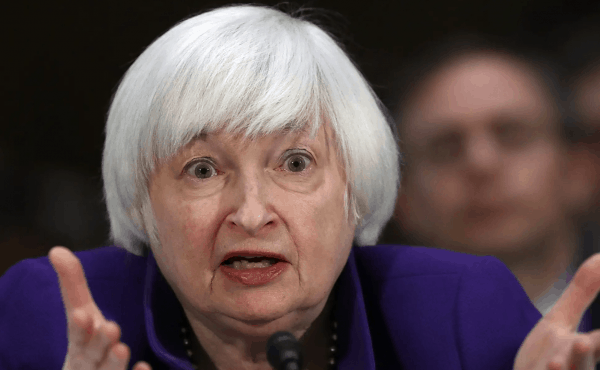Washington DC provides stiff competition when it comes to stupid ideas related to policy, spending, and taxation as regular fare, but the idea to tax unrealized capital gains is a real doozie.

Secretary of the Treasury Janet Yellen explaining her taxation proposal, “Just give me and Joe all your money. You can trust us to be good stewards. We can spend it better than you.”
WTF is an “unrealized capital gain,” Big Red Car?
It’s always a good idea to define the terms before discussing anything. Bravo.
1. When you buy an asset — such as a common stock you buy in your Etrade account — you establish your cost basis in that asset.
As an example, you may buy 100 shares of ABC Corp for $10/share, thereby establishing your basis in that asset as $1,000.
It doesn’t apply solely to stock. It could be land or a business — any capital asset.
2. If you were to sell that asset at a future date (let’s assume a year or more later, so it’s a long term capital gain) when the price increases to $20/share, your gross proceeds would be $2,000 (100 shares X $20/share).
You would generate a profit. This profit is a capital gain.
3. The exact magnitude of the capital gain is $2,000 gross proceeds minus $1,000 cost basis resulting in a long term capital gain of $1,000.
4. If you are in the top tax bracket, your long-term capital gains tax rate would be 20% of $200 on your $1,000 profit.
There is also something called the Net Investment Income Tax of 3.8% and there are state taxes (national average is 5.2%).
Conversely, the price may go down and you generate a long term capital LOSS which can currently be used to offset — be deducted from — other long term capital gains.
Uhhh, Big Red Car — what is an unrealized gain?
Sorry, got off topic for a second.
An UNREALIZED GAIN is one in which the underlying asset is not sold, but simply valued — comparing the price from last year to the price this year — even though you have not sold the asset and actually generated income.
It is this unrealized capital gain that the administration proposes to tax, not when sold, but when valued.
What’s the BIG DEAL, Big Red Car?
Ahh, the big deal. The big deal is this:
1. The Congress has given the Internal Revenue Service the authority to tax income at certain rates.
2. Income is subject to a concept called “constructive receipt” which means you have the income in your hot, little, avaricious hand and can spend it thereafter.
3. Unrealized gain is not cash in hand and you cannot spend it. It is simply not income.
4. Income taxes are administered by reserving some portion of income — like a payroll check income tax deduction — and dipping into the actual flow of cash to pay the tax.
With unrealized gains, there is no liquidity event, no cash flow into which to dip, no source of cash with which to pay the tax.
Can you imagine the chaos for a taxpayer — who receives no income — trying to generate sufficient funds to pay taxes on illiquid, unreceived gains?
5. What does the admin propose if the value of an asset goes down? Will there be credits for unrealized losses?
There is a reason why INCOME is taxed rather than increases/decreases in value. Prices vary over time.
Bottom line it, Big Red Car
OK, here it is — the Biden/Yellen proposal to increase taxes on long term capital gains is bad enough. They propose to increase the long term capital gains rate to 39.6%.
That will kill capital formation and dampen investment.
A California resident would see the following taxes:
Federal long term capital gain rate — 39.6% (Biden/Yellen proposal) v 20% today
National Investment Income Tax — 3.8%
California long term capital gain rate — 13.3%
Total long term capital gain rate — 56.7%
A Texas resident would see the following taxes:
Federal long term capital gain rate — 39.6% (Biden/Yellen proposal) v 20% today
National Investment Income Tax — 3.8%
Texas long term capital gain rate — 0%
Total long term capital gain rate — 43.4%%
Now, the Biden admin wants to tax you every year on how much your asset has increased in value even if you receive no cash.
This is horrendously bad tax policy which will erect an enormous administrative burden whilst stifling the formation of capital, the building of wealth, and the chilling of investment.